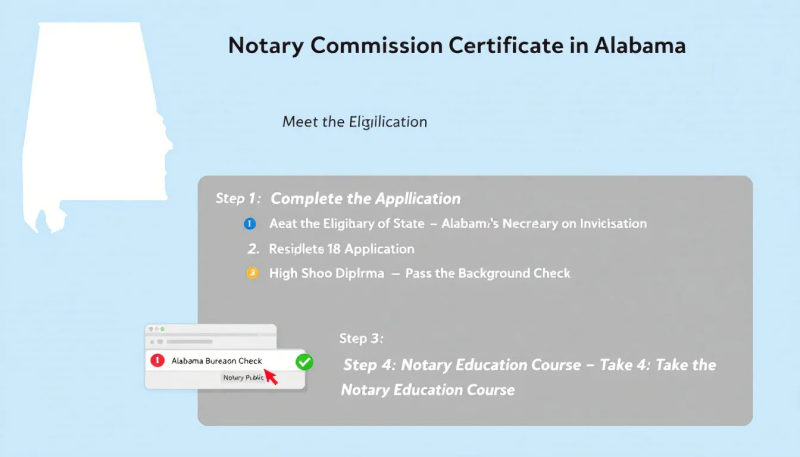To start a notary company in Alabama, you’ll need to meet certain requirements and follow a series of steps on how to start a notary company in Alabama. This guide covers everything from eligibility criteria to obtaining necessary supplies and growing your business.
Key Takeaways
- To start a notary business in Alabama, meet eligibility requirements, pass a state exam, and obtain your notary commission certificate.
- Essential supplies include a notary stamp and journal; consider investing in mobile tools like printers for convenience and efficiency.
- Effective marketing, such as building an online presence and networking with local businesses, is crucial for attracting clients and growing your notary services.
Understanding the Role of a Notary Public in Alabama
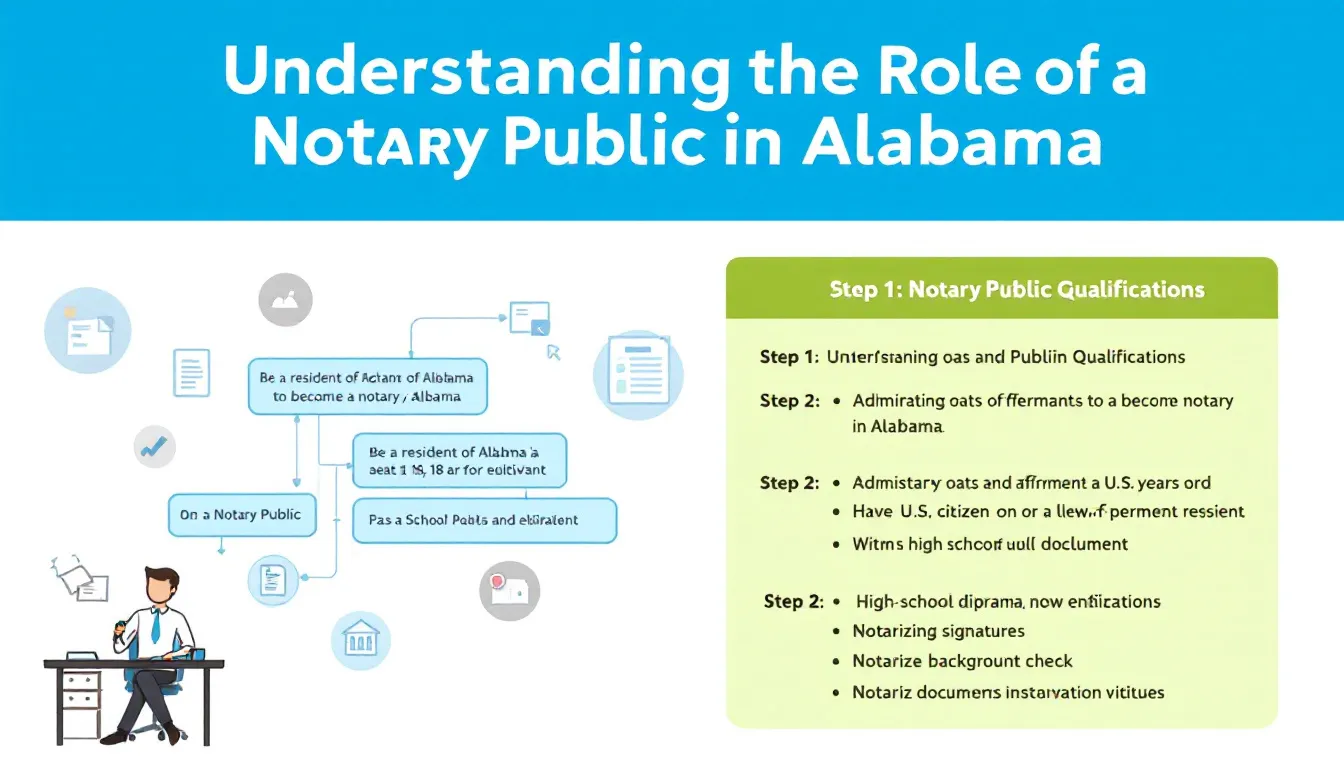
As a notary public in Alabama, your primary responsibilities include witnessing signatures, administering oaths, certifying copies, and performing acknowledgments for various documents. You play a crucial role in ensuring the integrity of the signing process and confirming the authenticity of the documents involved. Essentially, you act as a trusted third party who verifies that all parties involved in a transaction are who they claim to be and are signing willingly.
Mobile notaries take this role a step further by traveling to the client’s location to notarize documents, adding an element of convenience and accessibility. Mobile notary services ensure the correct individual is signing and that documents are executed properly by observing the signing process. This flexibility can be particularly appealing to clients who may have difficulty traveling or require notarizations outside regular business hours, making the travel notary business an essential service.
Meeting Alabama’s Requirements for Notaries
Before you can start your notary business in Alabama, you must meet certain eligibility criteria and complete the necessary application process. This includes passing a state-administered exam and obtaining your notary commission certificate.
Here’s a step-by-step breakdown of the requirements to become a notary public in Alabama.
Eligibility Criteria
To qualify as a notary in Alabama, you must be at least 18 years old and a legal resident of the county where you are applying. Additionally, candidates must have no felony convictions to be eligible for notary status.
These basic state’s requirements are the initial steps toward becoming a notary public.
Completing the Application Process
The application process for becoming a notary in Alabama involves several key steps. First, you must fill out an application form and submit it to the local county clerk along with a copy of your driver’s license and the required application fee. You must complete a notary training course and print the certificate within 30 days of your application submission. This training ensures you understand the duties and responsibilities of a notary public.
A thorough background check is also conducted as part of the application process. Applicants must not have any felony convictions unless their civil rights have been restored. Additionally, individuals currently in bankruptcy proceedings are not eligible to apply.
Accurately and promptly completing these steps will expedite obtaining your notary commission.
Passing the State Exam
To obtain your notary certification in Alabama, passing a state-administered exam is required. While you do not need to take a course to become a notary public in Alabama, it is highly recommended to familiarize yourself with state regulations and laws to ensure you are well-prepared for the exam.
If you fail the notary exam, don’t worry—candidates can retake it without any extra fee. After passing the exam, you may need to present proof of your training to finalize your notary commission. Passing this exam is a crucial milestone in your journey to becoming a notary public.
Obtaining Your Notary Commission Certificate
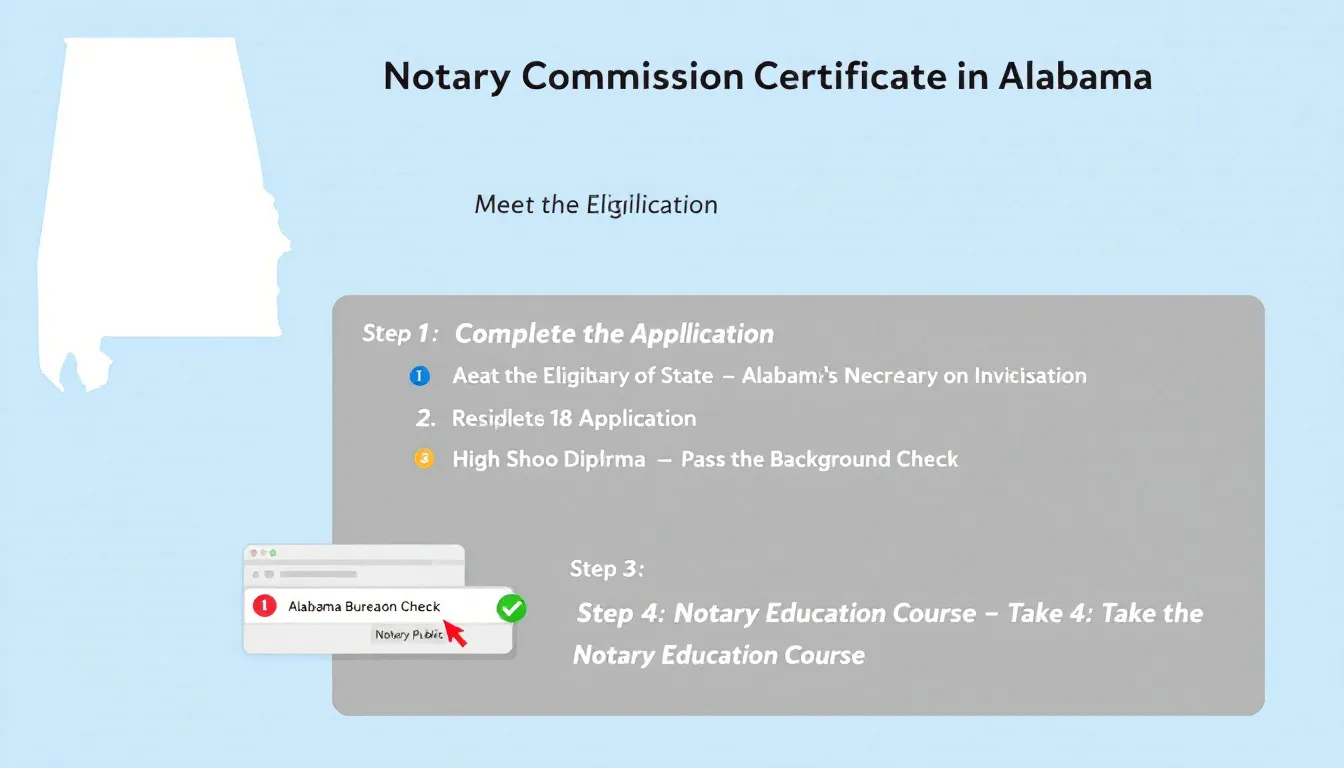
Once you have met all the eligibility criteria and passed the state exam, the next step is to obtain your notary commission certificate. This involves submitting your notary application along with identification and the required fee to the local county clerk’s office. You will receive an approval letter from the Probate Judge, which is a crucial step before obtaining your commission.
Your notary commission certificate is necessary for legally performing notarizations and establishing your business. The certificate officially recognizes your authority to act as a notary public in Alabama, enabling you to offer notary services and build a successful business.
Essential Supplies for Your Notary Business
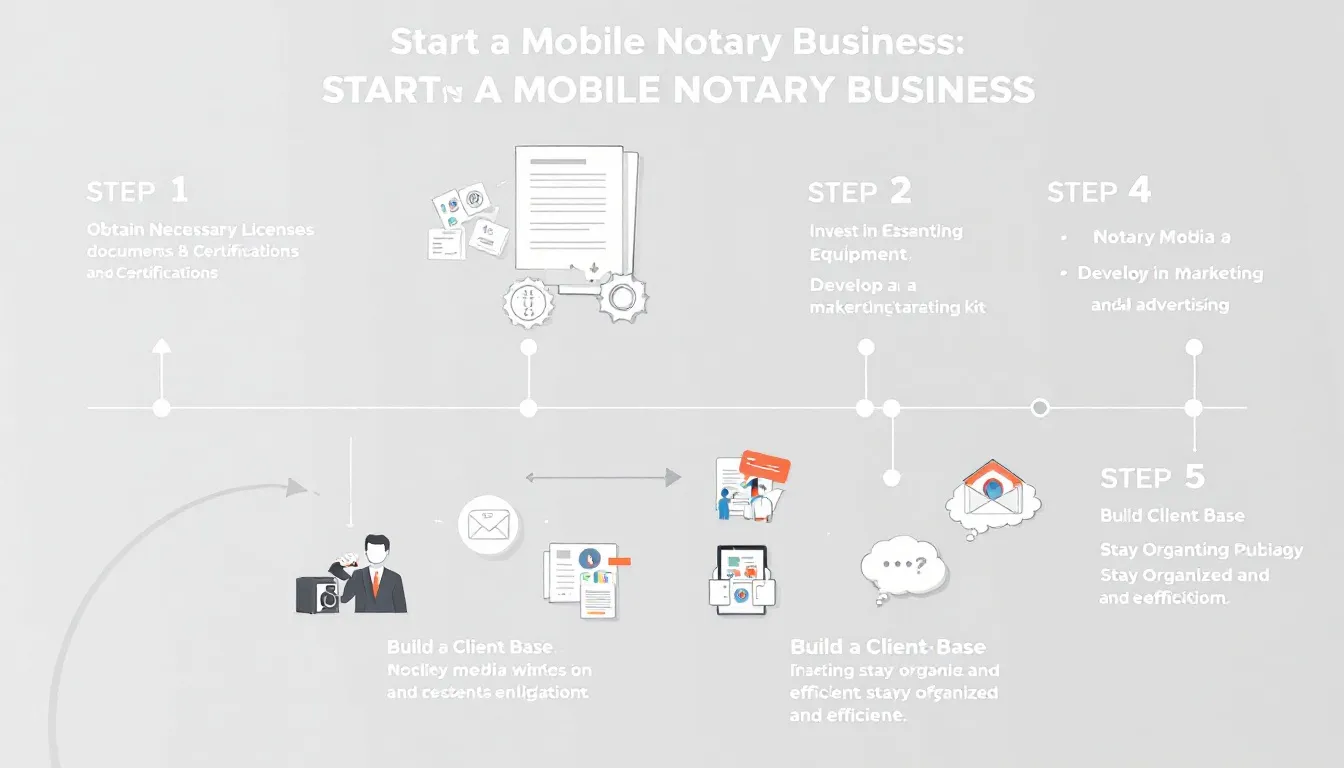
Running a successful notary business requires the right supplies. Essential supplies include a notary stamp, a notary journal, and additional equipment like a mobile printer or scanner.
These tools ensure efficient and professional notarization services.
Purchasing a Notary Stamp
A notary stamp is one of the most important tools for a notary public. It is used to officially execute notarizations and provide credibility to your services. You can purchase a notary stamp from various suppliers, including Amazon.
Ensure that the stamp meets state specifications and includes all necessary information.
Keeping a Notary Journal
A notary journal is vital for legal compliance and record-keeping. A notary journal should document all notarial acts, including details like the date, type of act, and identification used. This helps protect you and your clients by providing a clear record of all transactions.
Additional Equipment
Incorporating additional equipment can significantly enhance the efficiency of your mobile notary business. A mobile printer and scanner are essential tools that can improve operational efficiency and client convenience. The cost range for a basic laser printer, which is recommended for a mobile notary, typically falls between $250 and $400.
While these tools require an initial investment, they are crucial for providing professional and efficient services. Additional supplies like a mobile phone, laptop, and portable scanner can further streamline your operations and ensure you are well-prepared for any notarization task.
Getting Bonded and Insured
Getting bonded and insured is a critical step in protecting your notary business and clients. A surety bond and liability insurance provide financial safeguards and build trust with your clients.
Let’s explore these requirements in more detail.
Surety Bond Requirements
In Alabama, notaries are required to obtain a surety bond as part of their licensing process. The mandatory bond amount is typically set at $50,000. This bond provides a financial guarantee for ethical duty performance and compliance with state regulations.
Benefits of Liability Insurance
Liability insurance is essential for notaries as it protects against legal claims arising from errors or omissions in their duties. This insurance provides coverage for legal defense in case of claims against the notary, protecting personal finances. It also covers the costs associated with legal defenses if a notary faces a lawsuit, thereby enhancing credibility.
Having liability insurance helps safeguard against financial losses due to mistakes made during notarizations. It fosters trust and confidence among clients, ensuring they feel secure in the services you provide.
Liability insurance is a wise investment for any notary public.
Setting Up Your Mobile Notary Office

An efficient mobile notary office is crucial for providing professional services. A well-organized workspace should include essential supplies such as a notary stamp, notary journal, and relevant digital tools. Investing in a mobile phone, laptop, and portable printer is vital for managing appointments and printing documents while on the move, which is key to a successful mobile notary business.
A well-maintained vehicle is also important for a mobile notary. It presents a professional image and serves as a mobile advertisement for your mobile services. Additionally, digital tools can improve operations by helping manage appointments, enhance client communication, and securely store documents.
Investing in a portable scanner can facilitate document management for a mobile notary. A dual tray printer efficiently handles different paper sizes during notarization. Startup costs for a mobile notary business include notary supplies, marketing materials, and transportation. Ensuring you have all the necessary equipment will set you up for success.
Creating a Pricing Structure for Your Services
Establishing a competitive pricing structure is essential for attracting clients and building a successful notary business. Factors to consider include local notary fees, travel fees, travel time, distance, and the complexity of notarizations.
Let’s explore how to set your rates effectively.
Researching Local Rates
Researching local rates helps you determine what other notaries in your area charge and adjust your fees accordingly to remain competitive. The potential earnings range for mobile notaries per appointment is between $75 to $200. Understanding the competitive landscape will allow you to set your rates in accordance with the market, attracting more clients.
Regularly monitor local rates to adjust your pricing and ensure you remain competitive in the notary market. By keeping an eye on the market, you can offer fair and attractive rates to your clients.
Offering Flexible Payment Options
Understanding the spending habits of your clients can help you tailor your payment options to meet their needs. Offering mobile payment options, such as PayPal or Venmo, allows clients to pay conveniently from their devices. Providing discounts for prepayment can encourage clients to pay upfront and improve cash flow for your business.
Accepting cash payments is crucial as it caters to clients who may not use digital payment methods, enhancing overall payment flexibility. Offering flexible payment options will make your services more accessible and attractive to a wider range of clients.
Marketing Your Notary Business Effectively
Effective marketing is key to attracting clients and growing your notary business. From building an online presence to networking with local businesses and utilizing promotional materials, there are several strategies you can employ to market your services effectively.
Building an Online Presence
Establishing a professional social media presence is crucial for attracting clients and enhancing your notary business. Creating a Google advertisement can be a low-cost option to promote your notary services. Developing profiles on various notary listing platforms is a straightforward way to increase visibility.
Using social media platforms like Facebook, LinkedIn, and Instagram can help you reach a broader audience and engage with potential clients. Regularly updating your profiles with useful content and client testimonials will build trust and credibility.
Networking with Local Businesses
Engaging with local businesses and attending community events can significantly broaden your network. Joining local organizations, such as the chamber of commerce, provides valuable networking opportunities for notaries. Building relationships with local businesses can create new opportunities for potential customers, referrals, and business development collaborations.
Effective networking practices can lead to increased business visibility and improved client trust in your services. By becoming an active member of your local business community, you can establish a reputation as a reliable and professional notary, attracting more clients to your business name.
Utilizing Promotional Materials
Business cards and flyers are effective types of promotional materials that can help your notary business. Business cards serve as a vital tool for making initial contacts and promoting your notary services. Distributing flyers in local areas can effectively increase awareness of your services.
Creating and distributing promotional materials increases visibility and attracts clients to your notary business. With careful planning and strategic placement, these materials can significantly boost your marketing efforts and help you reach your target audience.
Legal Considerations for Alabama Notaries
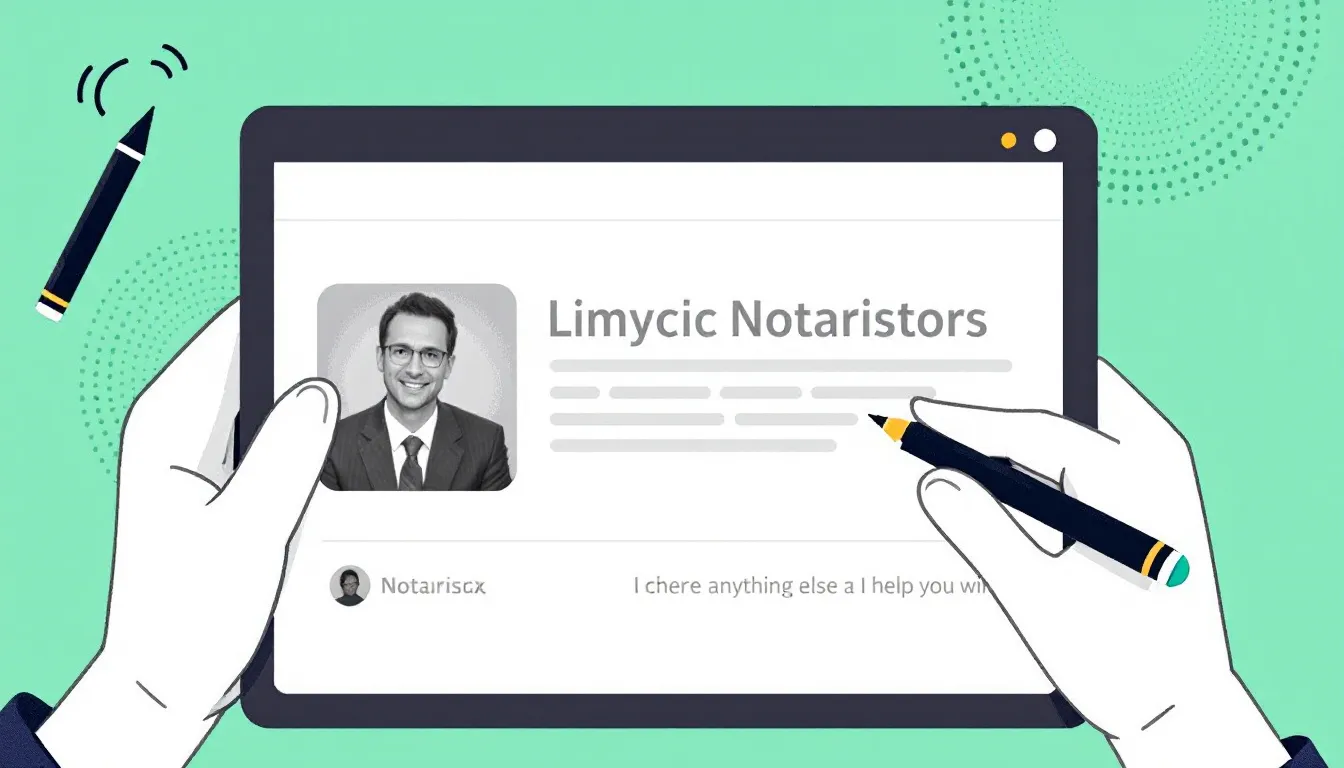
Notaries must comply with state regulations, maintain professionalism, and secure necessary protections like liability insurance. Understanding the legal considerations for Alabama notaries is crucial for ensuring compliance and preventing legal issues. This involves adhering to state laws, maintaining accurate records, and staying informed about any changes in regulations.
Complying with Alabama State Laws
Notaries must follow state laws for notarization to ensure their actions are legally binding. Familiarizing yourself with state rules and regulations is crucial to maintain the validity of your commission. Notaries in Alabama are responsible for verifying identities and maintaining accurate records of notarial acts.
Maintaining certification involves staying updated on state regulations and completing required continuing education. Positive identification of signers can be established through personal knowledge or government-issued photo IDs. Ongoing education ensures notaries are aware of changes in state regulations and helps them maintain their certification.
Record Keeping and Reporting
Notaries must keep a record of remote notarizations, which includes maintaining audiovisual recordings of the sessions. Audiovisual recordings are crucial for validating the remote notarization process and ensuring transparency in the transaction. Maintaining accurate records is essential for notaries to comply with public record requirements and uphold the integrity of the notarization process.
By documenting all notarial acts in a notary journal, notaries can protect themselves and their clients from potential disputes. Proper record-keeping is not only a legal requirement but also a best practice for running a successful notary business.
Expanding Your Notary Services
Expanding your notary services can open up new income streams and opportunities for growth. By becoming a notary loan signing agent, offering remote online notarization, and partnering with title companies, you can diversify your services and increase your earning potential.
Becoming a Notary Loan Signing Agent
Notary loan signing agents facilitate the signing of loan documents, ensuring all paperwork is completed accurately and legally. The most profitable type of notary is usually a notary loan signing agent. This type of notary often generates the highest income compared to others. After gaining experience, notaries may receive additional work from mortgage firms, further increasing their income.
Building relationships with loan officers and escrow officers can help notaries receive loan signings. Some companies may require notaries to be National Notary Association Certified. Specializing as a notary loan signing agent and working with notary signing agents can provide opportunities for higher earnings and demand from financial institutions.
Offering Remote Online Notarization
Remote online notarization allows notaries to perform notarizations via video conferencing, expanding accessibility and convenience for clients. During remote notarization, the notary and signer interact via audiovisual technology, meaning they do not meet in person. The process typically involves verifying the signer’s identity through various methods, including knowledge-based authentication and credential analysis.
The interaction between notary and signer is fully facilitated through the use of digital platforms that support remote communication. Offering remote online notarization can attract clients who prefer the flexibility and convenience of online notary signing services, further expanding your client base.
Partnering with Title Companies
Teaming up with title companies can provide notaries with a steady stream of clients, particularly in real estate transactions involving real estate agents. Notaries can often enhance their income by collaborating with title companies, which may provide higher fees for services rendered.
Networking with title companies can lead to consistent work opportunities for notaries. Building partnerships with title companies not only strengthens a notary’s business presence but also elevates their earning potential.
Summary
Starting a notary company in Alabama involves understanding the role of a notary public, meeting the state’s requirements, obtaining the necessary supplies, and effectively marketing your services. By following the steps outlined in this guide, you can establish a successful notary business and expand your services to maximize your earning potential. Remember, attention to detail, professionalism, and continuous learning are key to your success.
Frequently Asked Questions
What are the basic requirements to become a notary in Alabama?
To become a notary in Alabama, you simply need to be at least 18 years old, a legal resident of the county where you apply, and free of felony convictions. It’s pretty straightforward!
How do I obtain a notary commission certificate in Alabama?
To obtain a notary commission certificate in Alabama, just submit your application, ID, and the fee to your local county clerk’s office. Once the Probate Judge approves it, you’ll receive your certificate!
What supplies are essential for running a notary business?
To run a notary business effectively, you’ll need a notary stamp, a notary journal, and perhaps a mobile printer or scanner for added convenience. These essentials help ensure you provide professional and efficient services every time.
Why do I need a surety bond and liability insurance?
You need a surety bond to ensure you fulfill your obligations ethically, and liability insurance to protect yourself from any legal claims that might come from mistakes in your work. Both are essential for safeguarding your business and your reputation.
How can I expand my notary services?
To expand your notary services, consider becoming a notary loan signing agent, offering remote online notarization, and collaborating with title companies. This approach can boost your earnings and broaden your client base effectively.
